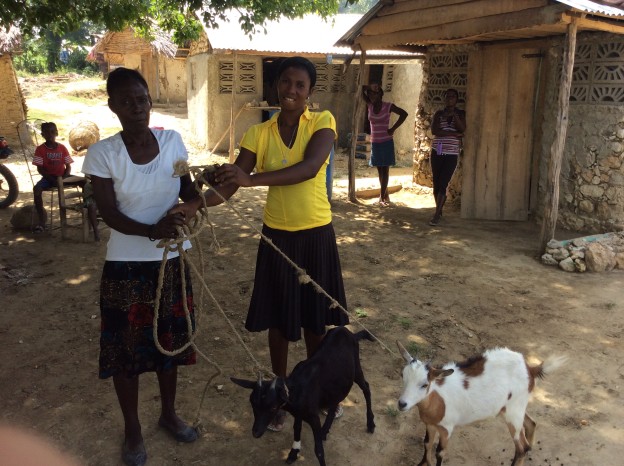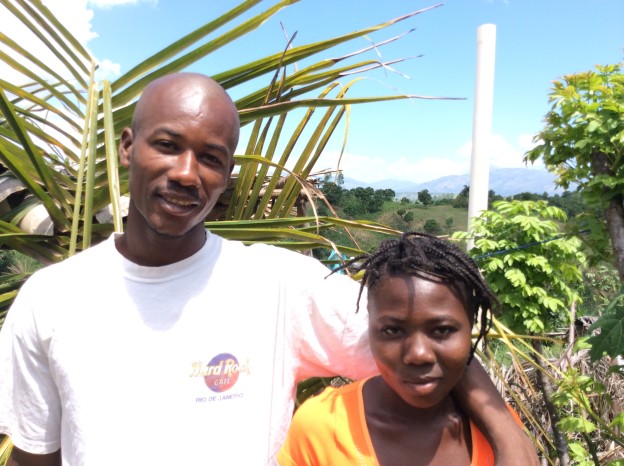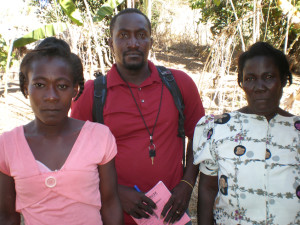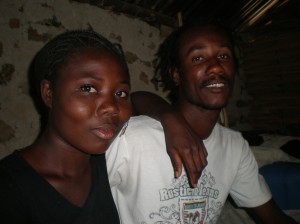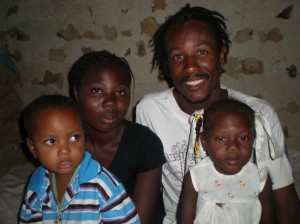August 24, 2014
When our director, Gauthier, describes the way our team moves, he talks of a “bale”, or a broom. We sweep through each neighborhood, integrating all the residents who qualify for the program before we move to the next neighborhood. And we generally pass through an area only once.
But even Gauthier will admit that we’re not perfect. We can miss people for various reasons.
The problem we have faced most often is from women who choose not to join program. As poor as the families we aim to serve are, they can be afraid to take advantage of what we offer. It must seem too good to be true. And they often have neighbors and family members who encourage them in their distrust, jealous that they have not qualified for the program themselves.
But we’ve made a lot of progress at preventing such problems in the years since we first started. We’ve added community meetings to the first steps we go through early in the process. Once we decide whom we will invite into the program in a given community, we invite the community’s leaders to listen to an introduction to the program, trying to get them to be our advocates to families who might be on the fence. It’s made a difference.
Even so, however, we occasionally find people who have fallen through the cracks, and we haven’t found a dependable way to help them. They remain a small stain on our dream of eliminating extreme poverty in the Central Plateau, but the small stain is important when we consider what it really means to leave a family behind: hunger, sickness, and a future with very little hope.
Roselène is an example. She lives in a remote corner a Venis, a sprawling patchwork of hilly farmland just south of Mirebalais. We had no trouble finding just over 50 families to work with in the area. When our selection team passed through Venis, we talked to Roselène and her husband, but we didn’t qualify them for CLM because of a misunderstanding.
Members of our team were trying to identify what larger livestock the couple might have. We don’t take families who own large, valuable animals like cows or mules. They saw Roselène’s husband managing a cow and a horse, so they asked him whether he owned them. People will often hide their wealth if they know that we have something to offer to the ultra poor, so one of the people on our team told the couple that we would be offering free vaccinations to livestock, but we had to talk to the true owners. Roselène’s husband was only looking after the animals for a wealthier neighbor, but rather than risk losing that chance to get vaccine for animals in his care, he lied and said they belonged to him. So our team moved on to the next house.
Shortly after that, we started serving the neighborhood. As the members started to make progress towards lifting themselves out of extreme poverty, Roselène could only watch. We had left her behind. And a couple of weeks later, the owner of the cow and the horse took them back from her husband. They were left with nothing.
But in every neighborhood we work in, we establish a Village Assistance Committee. These committees are made up of local volunteers, and they help us ensure the program’s success in various ways. They support members on days when the case manager is not around, either helping them contact the case manager or intervening directly. They provide an added layer of supervision, ensuring members learn to take care of the assets we give them. And they bring resources to members who need extra help as they are beginning to turn their lives around.
The committee in Venis has been especially active, and as the months went by they expressed frustration at the fact that we were doing nothing for Roselène, though they identified her as one of the poorest women in the area.
Rather than complain about it, however, they took action. Committee members decided to pitch in to buy her the roofing material she would need to build a new house, and they contributed the lumber by culling it from their own land. They were managing a small effort to build a community latrine, but they took some of the materials they has set aside and built a latrine for Roselène instead, redesigning what they would build for the community along more limited lines to compensate for the extra expense.
But to get Roselène on the road out of extreme poverty, even on a slower track than the one we usually provide our members, would require some investments beyond what the committee members were able to provide, so they asked us to help.
First, we needed to establish that Roselène is as poor as they say. We have occasionally heard from committees about families that need our help only to discover that the families are not as poor as we’ve been led to believe. So Elvoit, the case manager who works in Venis, went to meet her, and he redid the selection survey. Without the livestock that her husband had pretended to own, she qualified easily.
Then I went out to verify his findings. I wasn’t sure where she lived, but I had an easy way to find her. I went to Jésumène, a CLM member from Venis whom I know well, and asked her whether she could show me where her husband’s other wife lives. Jésumène and Roselène are matlòt, or women married to the same man. It felt like an awkward question to ask, but Jésumène showed no awkwardness in her answer. She was glad we were going to help Roselène. She talked about how badly Roselène had been doing since their husband became sick, unable to work. Jésumène herseld has two older sons who can help her. The second, Bonapart, is especially hard working. And she has CLM as well. But Roselène, she said, really needed help. She called over one of her daughters, who led me straight to Roselène’s house.
A short interview was enough to show me that the committee was right. This enabled me to mobilize some of our resources. We gave her a water filter and a five-gallon jug, and we found a little money to pay a local builder to start work on her home.
But there is not much a woman can do to change her family’s life if she has no assets to develop. Though we think of our program as a comprehensive approach to poverty alleviation, the core of what we do is on the economic side. Roselène was happy about her new house and latrine, but she needed a way to generate income, too, and fortunately we had a solution.
Since the very beginning of the program, we have operated with a consistent principle: the assets we give our members are theirs to keep. The program was developed for families too poor for credit, so our leadership decided to base it entirely on grants.
New partnerships can mean new opportunities, however, and they can also call for compromises with groups whose principles are different from ours. The 360 CLM members in the group I work with right now were sponsored in part by Heifer International, a major organization that we were working with for the first time. (See: http://www.heifer.org.) At the core of Heifer’s approach is a practice they call “passing on the gift.” The poor who receive livestock from Heifer are expected to give offspring to other members of their community. It is a way to ensure that the benefits Heifer provides are shared as widely as possible. We have generally felt that our members are too poor for such and approach, that they need the ability to accumulate their own assets quickly to escape persistent hunger.
So we worked out a compromise. Members supported by Heifer would receive four goats instead of two, and then pass two of the offspring on to other deserving families. Fortunately, Venis is one of the neighborhoods where our work is partially supported by Heifer, so all 52 members there received extra goats. They are now reaching the point at which we can begin to ask them to give some away.
Tuesday, Elvoit worked together with the Village Assistance Committee to organize a small, ceremonial passing-along of the gift to Roselène. He selected Paquese Salomon, a woman from Rato, which sits along the entrance to Venis from the north. Paquese has been particularly successful with her livestock. Though she started with nothing, she already has more than $400 worth and has set aside almost $150 more to buy another large animal. The minimum standard for graduation from CLM is about $200, and she has a few more months in the program to continue growing. She’s doing very well.
So they invited Gauthier and me to join them. It would be our first experience with Passing on the Gift, so we wanted to be present. We sat in a circle in Paquese’s front yard. Nine of the committee members were there, including the two who are, themselves, CLM members. There were speeches from Elvoit, from Gauthier, from the Committee’s president, and from one of the CLM women who sits on the Committee.
Gauthier especially wanted Paquese to speak, because we wanted to know what giving away assets might feel like for a member of CLM. So he asked her to say a few words.
“Se te kondisyon an,” was her initial response. “That was the deal.” She knew that the reason she had received four goats instead of two was that she’d have to give two of them away.
But Gauthier wanted to hear more, so he asked her how she really felt about it in her heart, and the committee president expressed his desire to hear her as well. So she thought for a moment, and then finally explained that she was really happy. “I used to live like she was living. I had the same kind of problems. Now I’m someone who’s able to help.”
We are unlikely to make Passing on the Gift a regular part of CLM. It is complicated to administer, and might turn out to be expensive. But for Roselène and Paquese, it offered real rewards.
